#Lyric coloratura soprano
Text
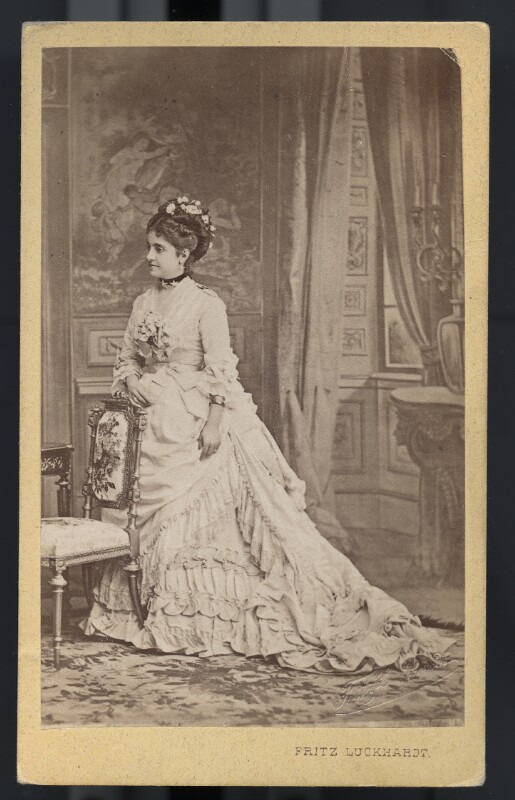

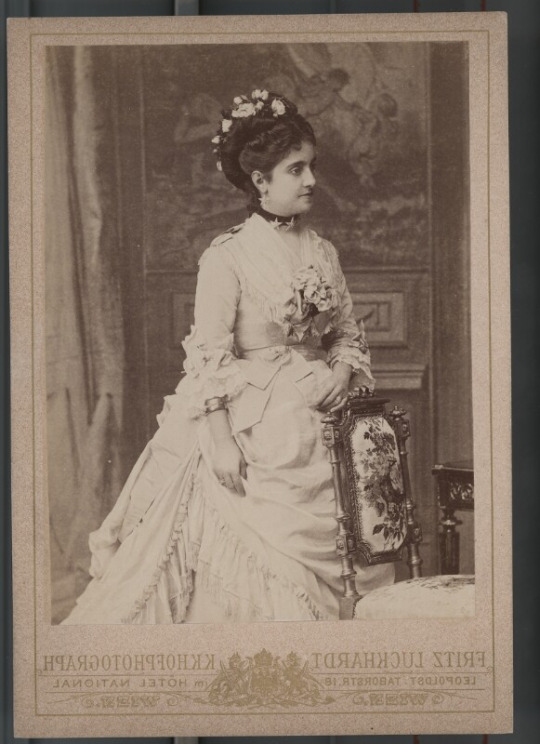
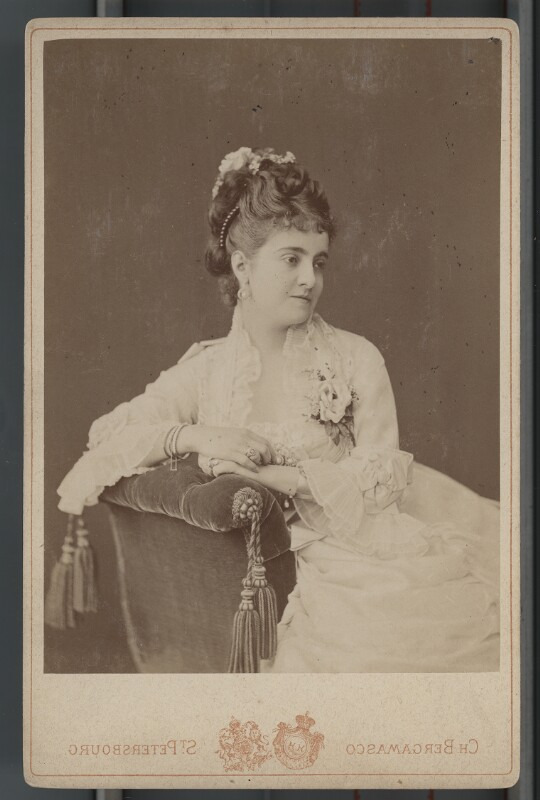


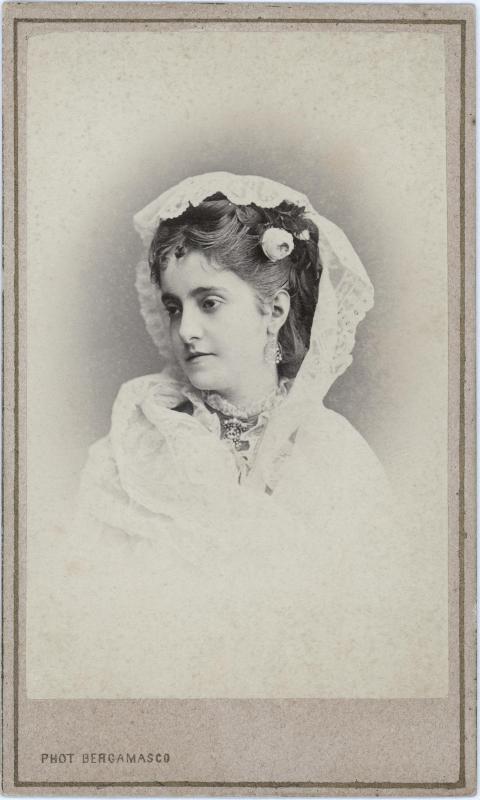

“ Probably no other singer ever remained on the stage as long as Patti, and none certainly ever succeeded so long in making every bar she sang, almost equal in value to a bar of gold.” New York Evening Post 1903.
“ She was a fine lady whose name was known the world over as having the most beautiful voice. She had lovely jewels, lovely palaces and lovely horses. There is a queen, maybe one in every country, but there is only one Queen Of Song. When Patti sang, she made the people forget all that was nasty and bad, huge crowds of people used to stand in the street just to hear her sing. To have a voice like Patti, was to walk about with heaven inside." Luisa Tetrazzini
Emma Calve.. “Patti’s charm and artistry are divine, almost miraculous. Her voice is like a string of luminous pearls, perfectly matched, every jewel flawless, identical in form and color.”
Luisa Tetrazzini.. “ Patti is a majestic being, more divine than human, so exalted that it was almost sacrilege to speak her name.”
Nellie Melba.. “ Patti has always been an idol, and her voice is perhaps the most golden I have ever heard: the timbre of it was exquisite, the diction crystalline.”
Jenny Lind: “ There is only one Niagara; and there is only one Patti.”
#classical music#opera#music history#bel canto#composer#classical composer#aria#classical studies#maestro#chest voice#coloratura soprano#Covent Garden#Royal Albert Hall#lyric coloratura soprano#Paris Opéra#La Scala#Metropolitan Opera#Carnegie Hall#Her Majesty's Theatre#His Majesty's Theatre#the nightingale#classical musician#classical musicians#classical history#history of music#historian of music#musician#musicians#diva#prima donna
8 notes
·
View notes
Note
yo what's your vocal range??
I’ve been taking private voice lessons under professionals in classical singing and musical theater since I was 15 years old, and now I’m almost 27-and-half, so it’s been almost twelve-and-a-half years since then. Technically, I’m capable of using a three octave vocal range from F#3-F#6/Gb6. I’ve learned arias and songs in which I’ve touched all three of those octaves at one point or another in private lessons. Of course, the extremes of the lower end (A3-F#3) and upper end (E6-F#6) aren’t notes I’m capable of singing when I’m on my period, I’m feeling exhausted, or I have a scratchy throat. I’d say I fall in the fach of light lyric soprano with a coloratura extension.
Range in and of itself doesn’t determine voice type, though There are sopranos who never sing higher than a C6. There are mezzos, contraltos, baritones, basses, and tenors who can hit notes well above and/or below their vocal passagio. Range is about the passagio your voice sits most comfortably. It’s not how many octaves you can produce. That being said, while it’s impressive for the average person with no professional vocal training, the average professionally trained singer can generally access about three octaves. Anything more than that is a rare gift.
#anonymous#vocal range#gb3-gb6#classical training#lyric soprano#musical theater#coloratura soprano#I have a three octave vocal range#opera#light lyric soprano#I’ve been taking lessons for more than 10 years too
15 notes
·
View notes
Text
I found a site that will measure pitch from your mic, so naturally I wanted to test it.
So here's my range I guess:




My comfortable range is C4 to E7, but I can go as low as A3 and as high as D8. Fun!
1 note
·
View note
Text

Minnie Julia Riperton Rudolph (November 8, 1947 – July 12, 1979) was an American singer-songwriter best known for her 1975 single "Lovin' You" and her four octave D3 to F♯7 coloratura soprano range. She is also widely known for her use of the whistle register and has been referred to by the media as the "Queen of the Whistle Register."
Minnie Riperton grew up in Chicago's Bronzeville neighborhood on the South Side. As a child, she studied music, drama and dance at Chicago's Lincoln Center. The youngest of eight children in a musical family, she embraced the arts early. Although she began with ballet and modern dance, her parents recognized her vocal and musical abilities and encouraged her to pursue music and voice. At Chicago's Abraham Lincoln Center, she received operatic vocal training from Marion Jeffery. She practiced breathing and phrasing, with particular emphasis on diction. Jeffery also trained Riperton to use her full range. While studying under Jeffery, she sang operettas and show tunes, in preparation for a career in opera. Jeffery was so convinced of her pupil's abilities that she strongly pushed her to further study the classics at Chicago's Junior Lyric Opera.
The young Riperton was, however, becoming interested in soul, rhythm and blues, and rock. In her teen years, she sang lead vocals for the Chicago-based girl group the Gems. Eventually the group became a session group known as Studio Three and it was during this period that they provided the backing vocals on the classic 1965 Fontella Bass hit "Rescue Me".
After graduating from Hyde Park High School (now Hyde Park Academy High School), she enrolled at Loop College and became a member of Zeta Phi Beta sorority. She dropped out of college to pursue her music career.
Her early affiliation with the legendary Chicago-based Chess Records afforded her the opportunity to sing backup for various established artists such as Etta James, Fontella Bass, Ramsey Lewis, Bo Diddley, Chuck Berry and Muddy Waters. While at Chess, Riperton also sang lead for the experimental rock/soul group Rotary Connection, from 1967 to 1971.
On April 5, 1975, Riperton reached the apex of her career with her No. 1 single "Lovin' You". The single was the last release from her 1974 gold album titled Perfect Angel. Riperton's third album, Adventures in Paradise was released in 1975. Despite the R&B hit "Inside My Love", some radio stations refused to play "Inside My Love" due to the lyrics.
Her fourth album for Epic Records, titled Stay in Love (1977), featured another collaboration with Stevie Wonder in the funky disco tune "Stick Together".
In 1978, Richard Rudolph and Riperton's attorney Mike Rosenfeld orchestrated a move to Capitol Records for Riperton and her CBS Records catalog. In April 1979, Riperton released her fifth and final album, Minnie. "Memory Lane" was a hit from the album.
Riperton provided backing vocals on Stevie Wonder's songs "Creepin'" from 1974's Fulfillingness' First Finale and "Ordinary Pain" from 1976's Songs in the Key of Life. In 1977, she lent her vocal abilities to a track named "Yesterday and Karma", on Osamu Kitajima's album, Osamu.
In January 1976, Riperton was diagnosed with breast cancer and, in April, she underwent a radical mastectomy. By the time of diagnosis, the cancer had metastasized and she was given about six months to live. Despite the grim prognosis, she continued recording and touring. She was one of the first celebrities to go public with her breast cancer diagnosis but did not disclose she was terminally ill.
In 1977, she became a spokesperson for the American Cancer Society. In 1978, she received the American Cancer Society's Courage Award, which was presented to her at the White House by President Jimmy Carter.
Riperton died of cancer on July 12, 1979 at the age 31.
During the 1990s, Riperton's music was sampled by many rap and hip-hop artists, including Tupac Shakur, Dr. Dre, A Tribe Called Quest, Blumentopf, The Orb
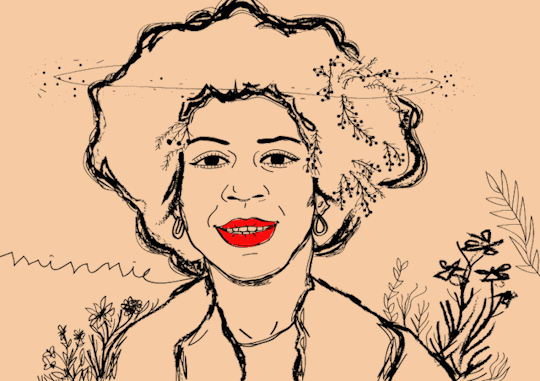
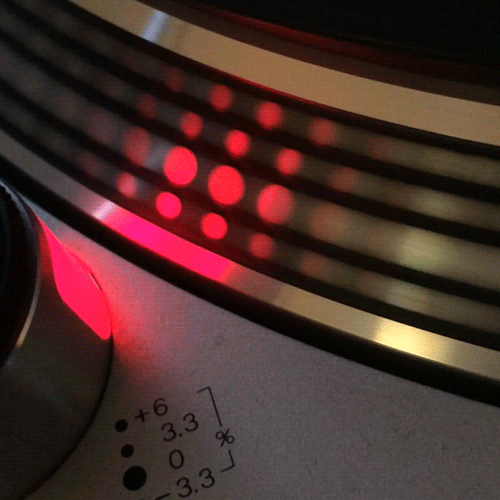
#african#afrakan#kemetic dreams#africans#afrakans#brown skin#brownskin#african culture#afrakan spirituality#riperton#tupac shakur#dr dre#a tribe called quest#the orb#minnie julia riperton#Minnie Julia Riperton Rudolph
242 notes
·
View notes
Text
Hello, people who follow me.
After being here on this hellsite for almost four years (darn, I’m getting old), I wanted to share with all of you one of the other things that I am crazy about—so crazy about it, that I went to SCHOOL for it—music.
I’ve mentioned it before, but just in case you didn’t see my posts talking about this, I am a classically trained singer; a light lyric coloratura soprano, to be precise.
That’s a really fancy way to say I have a “voice that has a warm quality with a bright, full timbre that can be heard over an orchestra.”
And the coloratura means that I have an even higher “extension” to my voice—that I can sing even higher than a plain light lyric soprano can, that my voice is agile, and can handle runs.
However, this song here is not an aria or any sort of classical repertoire, but it is a song from one of the many genres that I also trained for—jazz standards.
In fact, my senior recital was half classical, half jazz, my collaborative musicians some of the best in my area.
(My jazz pianist was my music theory and composition mentor—[thanks Mr. B!]—yes, I also compose; I have a really nice piano piece and Catholic Mass Setting under my belt if I do say so myself)
I recorded this in my church, after the Mass I regularly sing at, and the echo in the church, along with the microphone reverb kind of lends itself to a certain ambiance.
I hope you enjoy!!
On an aside, I also am posting this as a teaser for the next story that I hope to post soon on my fanfiction sideblog, @the-authoress-writes.
No spoilers, but this probably likely is a gigantic clue, I’ll be honest, 🤣!
Tagging some people whom I really want to see this:
@welsharcher
@valmare
@batmantaking-hobbits2gallifrey
@justhereforfandomandfriends
@musewrangler
34 notes
·
View notes
Text
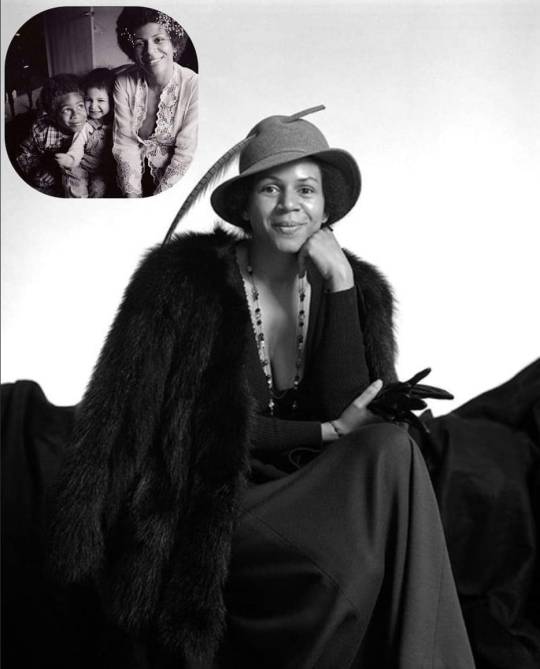
REMEMBERING MINNIE RIPERTON
Photograph of Minnie Riperton with her daughter actress Maya Rudolph and her son Marc Rudolph.
Minnie Julia Riperton Rudolph (November 8, 1947 – July 12, 1979) was an American singer-songwriter best known for her 1975 single "Lovin' You" and her four octave D3 to F♯7 coloratura soprano range. She is also widely known for her use of the whistle register and has been referred to by the media as the "Queen of the Whistle Register."
Minnie Riperton grew up in Chicago's Bronzeville neighborhood on the South Side. As a child, she studied music, drama and dance at Chicago's Lincoln Center. The youngest of eight children in a musical family, she embraced the arts early. Although she began with ballet and modern dance, her parents recognized her vocal and musical abilities and encouraged her to pursue music and voice. At Chicago's Abraham Lincoln Center, she received operatic vocal training from Marion Jeffery. She practiced breathing and phrasing, with particular emphasis on diction. Jeffery also trained Riperton to use her full range. While studying under Jeffery, she sang operettas and show tunes, in preparation for a career in opera. Jeffery was so convinced of her pupil's abilities that she strongly pushed her to further study the classics at Chicago's Junior Lyric Opera.
The young Riperton was, however, becoming interested in soul, rhythm and blues, and rock. In her teen years, she sang lead vocals for the Chicago-based girl group the Gems. Eventually the group became a session group known as Studio Three and it was during this period that they provided the backing vocals on the classic 1965 Fontella Bass hit "Rescue Me".
After graduating from Hyde Park High School (now Hyde Park Academy High School), she enrolled at Loop College and became a member of Zeta Phi Beta sorority. She dropped out of college to pursue her music career.
Her early affiliation with the legendary Chicago-based Chess Records afforded her the opportunity to sing backup for various established artists such as Etta James, Fontella Bass, Ramsey Lewis, Bo Diddley, Chuck Berry and Muddy Waters. While at Chess, Riperton also sang lead for the experimental rock/soul group Rotary Connection, from 1967 to 1971.
On April 5, 1975, Riperton reached the apex of her career with her No. 1 single "Lovin' You". The single was the last release from her 1974 gold album titled Perfect Angel. Riperton's third album, Adventures in Paradise was released in 1975. Despite the R&B hit "Inside My Love", some radio stations refused to play "Inside My Love" due to the lyrics.
Her fourth album for Epic Records, titled Stay in Love (1977), featured another collaboration with Stevie Wonder in the funky disco tune "Stick Together".
In 1978, Richard Rudolph and Riperton's attorney Mike Rosenfeld orchestrated a move to Capitol Records for Riperton and her CBS Records catalog. In April 1979, Riperton released her fifth and final album, Minnie. "Memory Lane" was a hit from the album.
Riperton provided backing vocals on Stevie Wonder's songs "Creepin'" from 1974's Fulfillingness' First Finale and "Ordinary Pain" from 1976's Songs in the Key of Life. In 1977, she lent her vocal abilities to a track named "Yesterday and Karma", on Osamu Kitajima's album, Osamu.
In January 1976, Riperton was diagnosed with breast cancer and, in April, she underwent a radical mastectomy. By the time of diagnosis, the cancer had metastasized and she was given about six months to live. Despite the grim prognosis, she continued recording and touring. She was one of the first celebrities to go public with her breast cancer diagnosis but did not disclose she was terminally ill.
In 1977, she became a spokesperson for the American Cancer Society. In 1978, she received the American Cancer Society's Courage Award, which was presented to her at the White House by President Jimmy Carter.
Riperton died of cancer on July 12, 1979 at the age 31.
During the 1990s, Riperton's music was sampled by many rap and hip-hop artists, including Tupac Shakur, Dr. Dre, A Tribe Called Quest, Blumentopf, The Orb and Tragedy Khadafi.
50 notes
·
View notes
Text
Fancasts for "An Eternal Crown: The Opera"
I'm being silly now and imagining what it would be like if my gender-bent Magic Flute retelling, An Eternal Crown, were adapted as an opera itself. It could be a "jukebox opera," consisting partly of music from The Magic Flute transposed, and partly of other music – for example, some of Handel's florid bass arias to take the place of the Queen of the Night's arias for King Vorteyo.
Sarisa and Zeran's voices I imagine as essentially Pamina's and Tamino's, since they are those two in reverse: a lyric soprano and a light lyric tenor. Lorikeet I can't help but imagine as a lyric coloratura. Vorteyo would be a bass, Alesta and Imara both motherly mezzos, Kimzi one of those roles like Zerlina that can be sung either by a soprano or a light mezzo, and Robin a lyric baritone. The Three Warriors I picture as a "heroic" Italian-style spinto tenor, and a baritone and bass in more of a Mozartean vein.
These are some of the singers I think might have been good in the roles in different eras:
An Eternal Crown: The Opera, circa 1960-1965
Sarisa: Irmgard Seefried or Gundula Janowitz
Zeran: Fritz Wunderlich or Nicolai Gedda
Lorikeet: Lucia Popp
King Vorteyo: Cesare Siepi
Alesta: Maureen Forrester
Kimzi: Teresa Berganza or Graziella Sciutti
Robin: Hermann Prey or Theodor Uppman
Imara: Marga Höffgen
Three Warriors: Giuseppe di Stefano, Eberhard Wächter, Fernando Corena
An Eternal Crown: The Opera, circa 1980-1985
Sarisa: Ileana Cotrubas
Zeran: Francisco Araiza or Peter Schreier
Lorikeet: Kathleen Battle
King Vorteyo: James Morris
Alesta: Marilyn Horne
Kimzi: Teresa Stratas
Robin: Håkan Hagegård, or a young Alessandro Corbelli
Imara: Janet Baker
Three Warriors: José Carreras, Thomas Allen, Samuel Ramey
An Eternal Crown: The Opera, circa 2000-2005
Sarisa: Ana María Martínez or Dorothea Röschmann
Zeran: Charles Castronovo
Lorikeet: Diana Damrau
King Vorteyo: Samuel Ramey
Alesta: Denyce Graves
Kimzi: Cecilia Bartoli
Robin: Rolando Villazón (it could have been an early light baritone foray for him)
Imara: Stephanie Blythe
Three Warriors: José Cura, Simon Keenlyside, Ildebrando d’Arcangelo
I'll think of more in the future.
7 notes
·
View notes
Text
In my legacy, River McIrish is going to not only be taking visual arts at university, but she is also a coloratura soprano in the vocal music program at UBC. Yes, I’m differing from the established canon from Sims 3 for River.
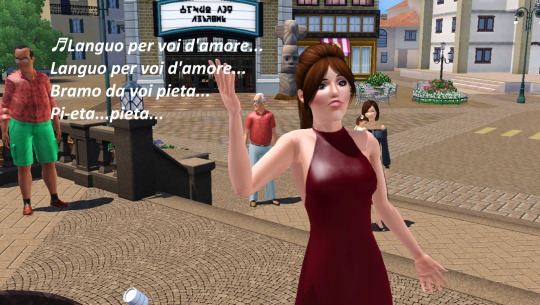
Her boyfriend (later to be husband in my legacy) is Haruo who is a lyrical tenor.
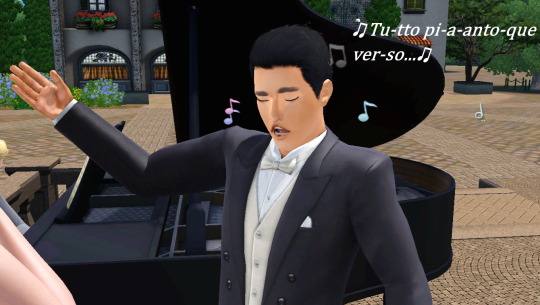
As a former baritone, myself, I used to find tenors annoying; they got all the good stuff.
So, I’ve decided that I’m going to find a list of the five arias from Handel that I love the most that River is going to perform at her recitals while she’s taking music at university. 🤣
1. 1st year -
Ritorna Oh Caro - Rodelinda
youtube
Tess Mattingly - Voices of Music recording /Video
One of the most natural interpretations of this Handel aria I’ve ever listened to. Tess pulls off the baroque style perfectly in this performance and I wish she would record more in the baroque period but she is an active singer doing opera of the Romantic period. (Puccini, Rossini, etc).
2. 2nd Year -
Oh, That I On Wings Could Rise - Theodora
youtube
A beautiful interpretation by the late Lorraine Hunt (Lieberson). This is the right pacing for an aria by a character who is being persecuted by the Roman Valens under threat of being executed for the crime of being a Christian under Roman rule. THIS is a lament, not a joyful wish.
3. 3rd Year -
Credete Al Mio Dolore - Alcina
youtube
Natalie Dessay is one of my favorite sopranos and this interpretation is probably one of the best I’ve heard, the character of Morgana being one of the most tragic as far as I’m concerned. She is second fiddle to Alcina throughout the entire opera, dragged into this web of deception and suffers an ignominious demise as Alcina’s whole world crumbles around her. Meanwhile Morgana just ends up losing her lover whom she cheated on while doing nothing evil to warrant such a fate other than to be Alcina’s sidekick.
4. 4th Year -
Tu Del Ciel Ministro Eletto -Il Trionfo del Tempo e del Disinganno.
youtube
Natalie Dessay again with this gorgeous aria from Handel’s Il Trionfo del Tempo e del Disinganno. The ONLY interpretation I’ll listen to of this piece.
5. Graduation Recital -
Rejoice Greatly, O Daughter of Zion - Messiah
youtube
Lynne Dawson’s interpretation of this famous air from the Messiah is one of the best I’ve heard, quiet but she hits all those rapid notes dead on. She doesn’t go into the vocal gymnastics of Kathleen Battle in the second round of the da capo aria but her interpretation and cadenza is clean.
Bonus: duet with Haruo for her graduation recital -
Air: Streams of Pleasure Ever Flowing/Duet: Thither Let Our Hearts Inspire
youtube
Lorraine Hunt (Lieberson) again with Drew Minter (countertenor)
So these are the arias and airs I’m going to have River do while she’s at university. The duet, Haruo would have to sing completely in falsetto as a tenor. He doesn’t have the chest voice and power of a true countertenor. 🤣
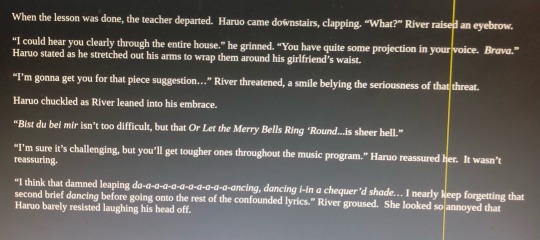
What River thinks of her audition piece to get into the UBC School of Music. 🤣
#Youtube#Georg Frideric Handel#sims 3#ts3#river mcirish#sims 3 storytelling#river and haruo#haruo chikamori#sims 3 legacy#The Chikamori Legacy
2 notes
·
View notes
Photo
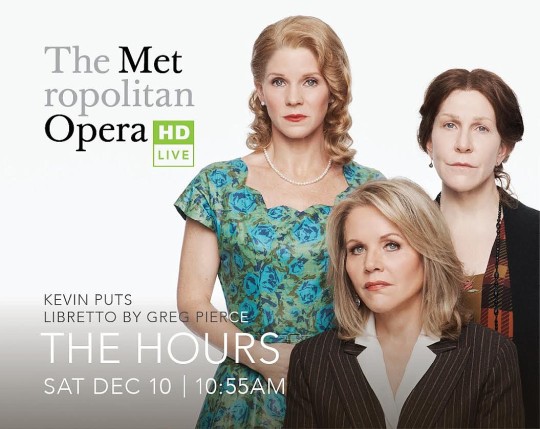
The Hours is a new opera with music by Kevin Puts and a libretto by Greg Pierce. Based on the novel of the same name by Michael Cunningham and its film adaptation, the production was chosen by star soprano Renée Fleming for her return to the Met stage. During the intermission interview, Puts and Pierce share that the piece was written almost entirely during lockdown, and shared their material and questions for each other via texts, calls, and emails. Fleming is joined onstage by mezzo-soprano Joyce DiDonato, and soprano Kelli O’Hara.
Act one starts strong with scenes featuring DiDonato as Virginia Woolf in 1923 working on her novel Mrs Dalloway; Fleming as Clarissa in the 1990s, preparing a dinner for her friend Richard, dying of AIDS; and the Metropolitan Opera chorus. Costumes by Tom Pye for the chorus have a startling dye job that, under the correct lighting, give the effect of the entire production being set underwater. However, the lighting changes from scene to scene, and the chorus never changes costume, leaving only a few further scenes in the remainder of the opera where the effect is again employed.
Puts’ score is most effective in its slower, lyrical sections, showcasing the Met Opera’s full orchestra. While not having heard any other work by Puts, the driving sections that propel the plot are typical of any other contemporary composer, i.e. Nico Muhly and John Adams, and not evocative of any personal style. Wind and string sections play highly rhythmic patterns that have slow harmonic changes, surely a nod to Philip Glass who scored the film version. The prelude to the first scene featuring Woolf is unfortunately scored for solo piano. It is both ineffective and jarring, barely able to accompany DiDonato’s rich voice by itself. The piano is brought back several times, and used for effect alongside the orchestra, to the detriment of the score as a whole.
It is in this scene when we are first introduced to Leonard Woolf played by the entirely miscast Sean Panikkar. Next to DiDonato, Panikkar looks like a hulking 7-foot-tall Adonis thirty years too young to play her husband. He had a pleasant tenor voice, but weak diction. Having to always share the stage with DiDonato also made it seem that his acting abilities were lacking, but I come up with a short list of other singers that could hold their own next to her.
Following this we are taken back to the 90s and treated to one of the two most striking scenes in the entire opera - the second is also in the 90s timeline, which is indicative. Clarissa is shopping for flowers and flirting with the owner, Barbara, played by Kathleen Kim. Kim has a fantastic coloratura voice and stage presence, put to great use by Puts who quotes several Mozart arias, a la Corgliano’s Ghosts of Versailles: the high Fs of the Queen of the Night enticing Clarissa to buy Ha-ha-ha-hydrangeas, and the final Pa-pa-pa-pa’s of Papagena for peonies. The entire chorus encircles them, bunches of flowers in both hands, the tableau bursting with colour and texture, reminding me of the framing of Mother Mary in the The Cell (2000) as well as the final shots of Midsommar (2019). My only complaint is that the bouquets could have been bigger and even more vibrant.
We are finally introduced to Kelli O’Hara’s Laura Brown in the 1950s, reading Mrs Dalloway in her bed, dreading to get up and greet her family on her husband’s birthday. This section came across as the weak link as the character had nonexistent motivations for her actions and a clichéd plot. How many stories in film and television have we already seen about a repressed housewife in the 1950s ready to buckle under the pressure of keeping the surface of her life glossy and clean? Brown feels no connection to her child and leaves him with a neighbour - also played by Kim - as she runs to a motel to kill herself with a bottle of pills. Her husband has done the irredeemable deed of buying her flowers and letting her sleep in on his birthday, and constantly showering their son with affection.
Kelly O’Hara’s acting was always visible, in the sense that it was constantly distracting to watch her and see her, for lack of a better term, go through the motions. Fleming and DiDonato in comparison seemed completely authentic. They were characters plucked from their lives and put on the stage, reacting to everything around them, and making choices and decisions moment to moment. There is something inexplicably off-putting about O’Hara’s performance, not even getting into the fact that the part is out of her grasp. The notes were there, of course, but the timbre of her voice was frequently strained, and not pleasant to listen to. Beside her co-stars there is a clearly audible gulf of technical proficiency between her and them.
Supporting the three leads is an ensemble of singers of mixed quality. Clarissa’s dying friend Richard is sung to perfection by bass-baritone Kyle Ketelsen. His rich voice could project at every dynamic, convey every emotion, and delivered every word with clear diction. His acting was also far better than most opera singers and met Fleming beat for beat, especially in the best scene of the entire opera where Clarissa visits Richard for one last time in his New York apartment. Clarissa’s partner Sally was played by Denyce Graves, whom I loved in Marnie, but sounded less than stellar in this live broadcast, every note uttered with a grating squawk.
In the 1950s Laura Brown’s husband delivered his lines serviceably, but not memorably. Her son was a a scene-stealer, and had a voice that projected loudly and clearly over the entire orchestra and chorus in the finale of Act 1. Back in the 20s, DiDonato is joined by another mezzo-soprano, Eve Gigliotti, playing the maid Nelly. From register to register Gigliotti’s voice was resonant and clear and I could only think of other parts I would love to hear her perform.
Finally, in another double-role, Sylvia D’Eramo plays Kitty in the 50s, and Woolf’s sister Vanessa in 1923. D’Eramo's voice seemed to belong to another singer, sounding more mature and full than her youthful looks would have you expect. She never took the focus away from O’Hara or DiDonato, but maybe should have been given the role of Brown instead. Next to O’Hara, D’Eramo was much more interesting to listen to and watch, and was able to play the young woman sharing a fleeting kiss with Brown, and mother to three as Vanessa.
There are two choices in this production that served no readily apparent purpose, and therefore failed in execution. First, a lone countertenor from the chorus singing wordlessly at the three leads throughout, the symbolism unclear if it had intention in the first place. Additionally, there is a dance cohort onstage for nearly the entirety of the production that serves no purpose other than to fill space, clutter the scenes with extra bodies, and brandish empty symbols of books, flowers, and kitchen appliances in the corresponding time periods. The oddest choice of all, to have one male dancer among the dozen or so women.
The set was disappointing and did not make use at all of the space and funds that the Met surely has at its disposal. Yet, in the second act there is one wow-element where a large silk screen comes billowing down from the ceiling and stretches right to the bottom of the stage to catch a set of black-and-white projections, a flashback with Clarissa and a young Richard on the beach, after which it is released and cascades to pool on the floor behind the singers. Again, it seems as the most care and attention is made for Fleming’s 1990s scenes.
Throughout the opera there is a reference to Richard’s book being great, but suffering from a ‘tacked-on’ ending. Ironically, this opera also suffers from the same fate. The finale is a chance for the leading women to shed their characters - none does so faster than O’Hara - adjusting their body language, and gazing directly into the audience, to address us in a trio containing only a handful of sentences, repeated ad nauseum with nearly no melodic variation, ‘Here is the world and you live in it. All alone. You try.’ I couldn’t tell if it was supposed to be sentimental, uplifting, melancholy, or what, but ultimately it comes across as smarmy. Richard Strauss this is not, despite Fleming and co. giving it their all.
#The Hours#metopera#renee fleming#joyce didonato#kelli o'hara#kevin puts#greg pierce#virginia woolf#mrs dalloway#phelim mcdermott
2 notes
·
View notes
Note
oooh i also read your tags and i’m curious what does being a singer (soprano specifically) say about my personality
hmm i think it depends on the kind of soprano. like are you a chorister or a soloist primarily...if it's musical theater are we talking classical soprano or mezzo belter...if it's operatic are we talking lyric or are we talking coloratura... more info needed to properly assess i think but by way of summation here's a joke from my choir days:
how can you tell when a soprano's on your porch? she can't find her key and doesn't know when to come in
#sasha answers#anon#SORRY IF THIS SOUNDS MEAN LOL#i know plenty of very nice sopranos !!#(most of them are. lyric sopranos admittedly BUT)#listen i'm an alto/contralto. i have to be playfully adversarial to sopranos i HAVE to
2 notes
·
View notes
Text
Lydia Lipkowska - Troilin: Lipkowska Waltz, 1911
THE SONGBIRD: Lydia Lipkowska [Лідія Липковська] (1882 - 1958) was born in the village of Babyn in Ukraine, which is very close to its borders with Moldova and Romania, during the era of the Russian Empire. Her aunt was a well-regarded stage actress. Lipkowska studied in St. Petersburg and made her debut in at the Mariinsky in 1906. She sang at The Met in New York from 1909 to 1911, including Violetta opposite Caruso's Alfredo. She also sang in Chicago and Boston before singing Mimi at Covent Garden in 1911 and then returning to Russia. Lipkowska fled the newly forming Soviet Union with her husband in 1920; once in New York she quickly got an engagement as Gilda with the San Carlo Opera Company in Manhattan. After retiring from the stage she lived in Romania and taught voice -- Virginia Zeani was one of her students.
THE MUSIC: One sign of soprano stardom in the Gilded Age was having a composer create a showy concert waltz just for you, such as Arditi's "Se saran rose," known as The Melba Waltz. This seems to be the case for Lipkowska. I am not able to discover any information about the composer, other than a listing of composer S. A. Troilin in an article about the influence of Ukrainian Cossacks in Russian culture. So, I assume he (she?) was from Ukraine and was commissioned or offered to compose this concert waltz to custom fit Lipkowska's voice. She likely sang it in recitals and concerts, perhaps as an encore.
#classical music#opera#music history#bel canto#composer#classical composer#aria#classical studies#maestro#chest voice#Lydia Lipkowska#Лідія Липковська#lyric coloratura soprano#soprano#Mariinsky Theatre#Metropolitan Opera#Met#Royal Opera House#Covent Garden#La Scala#Opéra-Comique#Singing Bird#Lipkowska Waltz#Troilin#classical musician#classical musicians#classical history#history of music#historian of music#musician
5 notes
·
View notes
Note
Hi! I notice you're a lover of classical/opera and a trained coloratura soprano. How did you get into the field, and how did you train? I would like to learn how to sing better, even though I don't have that range (right now I can sing down to the G/A below middle C and up to the Eb at the top of the treble clef reliably/without pain, although I'd like to improve this).
P.S. What is your favorite song you have done? :)
I have been in choirs since I was 14, and I’ve been taking private voice lessons since I was 15, so I’ve been getting professionally trained for almost 12-13 years now. However, singing turned out to be a hobby for me, rather than a profession. I wanted to do it professionally, but I realized that I really struggled with playing the piano due to a disability in my right hand. Yeah, technically, I can move that right hand, but, due to a mild prenatal stroke, I was born with Hemiplegic Spastic Cerebral Palsy. As a result, that right hand cannot be used to perform in tasks that require fine motor skills, such as writing, typing, or playing a piano. Also, I struggled with the music theory part that was required in the vocal performance major/minor. I’ve learned some basics of it, but it became difficult to learn with all the pressure of my other studies.
I ended up majoring in English and I’m working as a temp in administration and sales now. I still keep up my lessons in singing now, even though I just turned 27, because it’s always been something I’ve been good at doing. I like doing my recitals.
I think my range is technically somewhere between low F3 or Gb3 to a high F#6, so it’s the average three octave range of most trained professionals, which I’m happy with.
I think my favorite pieces that I’ve learned to sing were Una Voce Poco Fa (soprano) (The Barber of Seville), Mozart’s soprano arias, especially the Queen of the Night arias from The Magic Flute, Je Veux Vivre from Romeo et Juliette, and operetta pieces like “Poor Wandering One,” and “Glitter and Be Gay.” I like classical arias and songs that movie around a lot vocally.
I still take lessons, though with work, it has become difficult finding time to practice, aside from Friday and the weekends. The truth is that you can’t really change your natural range after puberty, unless you are someone who smokes heavily, develop vocal nodules from vocal misuse, or takes blockers, testosterone, or estrogen hormones to undergo a sex change and/or prevent pubertal development.
In general, though, for the average person, their vocal range doesn’t usually technically change after the age of 16. Certain notes can and/or will open up and and become easier or harder to access depending on your breath support (breathe from your diaphragm), your technique, your age, your posture, whether you’re on your period or not, whether you’ve been through memo how energized you are, your throat’s health, how hydrated you are, whand whether you’re on a medication that messes with your throat or not. You also just have to practice singing those notes with proper technique as much as you can, if possible.
A common misconception is that range determines what fach (type) your voice falls in, but that’s not really true either. Michael Jackson could technically hit all the way up to a soprano F6, but he was still very much a lyric tenor. In his earlier days, Elton John could hit up to a soprano high D6, but he was a tenor and baritone. Christina Aguilera can technically get up to a C7, but she’s still a mezzo soprano because her middle range is her vocal sweet spot, not her upper range. Renee Fleming, Kristen Chenoweth, Kathleen Battle, Sarah Brightman, and Mariah Carey’s vocal sweet spot is in their upper range, so even though some of them may be
#singing#classical singing#opera#musical theater#I’ve been getting professionally trained for like almost 12 years now
5 notes
·
View notes
Text
I'm on the vocal side of YouTube (very 2015 I know) but sometimes it's pure delusion.
No hate to anyone but:
1. Mariah Carey is not as good as before and has regressed in terms of vocal ability. She can still sing but to expect her to sing like 20-30 year olds as a 50 year old is pretty stupid and y'all setting her up for failure by gassing her up.
2. Miley Cyrus voice while beautiful now deepened due to unhealthy habits. (I love her lows but don't act like it's was purely natural)
3. Rihanna has vocal chops, y'all just like high notes and sporanos and mezzo's with higher tessituras. Rihanna is a competent singer with a good understanding of her voice and can use it to the best of her abilities along with consistence within her range.
4. Ariana and Demi have fine, if not stellar, techniques. All this resonance and support nonsense makes no sense as if they weren't supporting their notes, they would be straining and their voices would have been damaged to hell and back since the beginning of their career as they been consistently singing out side of their supported range (usually one octave) for 5+years.
5. Not all singers have to be Mariah Carey/Celine Dion levels to be good. Different styles of music exist meaing different skills (techniques) are needed to the style. Belting would not suit Lana's style, loud and tangy vocals wouldn't fit Kali's style, and clear vocal and no distortion wouldn't fit Taylor Momsen style.
6. Y'all saying theres no interesting male singers is purely confirmation bias. You don't care for male singers ( Gerard Way, Bruno Mars, Patrick Stump, Brendon Urie, Shawn Mendez, the Weeknd, James Snyder, the list goes on) so you don't listen to them. There are many talent male vocalists (look in any gospel, musical theater, rock, rnb group) and you'll find a plethora of talented male vocalists. You just don't care.
7. Not every new era is a singers prime.
8. Using classical opera classifications(like the Fach system) is stupid. Most pop vocalist, this include non-opera trained singers, will not fall into any category. The only reason Bebe Rexha can say she's a coloratura soprano is cause that was her classification given by her teacher. You can't call Ariana Grande a light lyric soprano as she was trained in musical theater, which has it's own classifications, not opera. Opera has specific sounds they train singers to produce, it's not just something you can do. Ariana is most likely that classification but it's not written in stone and voice type is more than range (tessitura, vocal color, vocal weight, flexibility, and passaggio)
0 notes
Text

Don't Let the Sun Blast Your Shadow
A Musician Alternate Universe for Henry Fox of RWRB!
Some verse notes for my own edification:
Henry was quite literally born into the musical industry, the third child of the infamous genre-bending musical sensation, Arthur Fox, and Lady Catherine, a celebrated coloratura soprano and recipient of the Royal Philharmonic Society's Gold Medal Award.
He's a classically trained pianist, cellist, and upright base player, but comfortably takes to most any stringed or chordophone instrument. This makes him a surprise savant on bass guitar and (weirdly) Harpsichord.
Although known to be a protégé from an early age, Henry came into adulthood well established as a musical talent in his own right. By the time he was fifteen, he'd already charted the global top ten with a debut album he produced with his older sister and his best friend, a collection of unexpected tracks that mixed classical and contemporary sound in accompaniment to Bea's haunting lyrics.
Henry's musical contract is handled by The Firm, one of the most powerful mainstream production companies in the industry. Since his debut, they have held control over Henry's image, his masters, and the content he is allowed to produce until their label.
When Arthur Fox died, Henry's music dried up. He didn't pick up an instrument for 14 months, but was forced to continue making appearances due to his contractual obligations. Then one day, like a dam bursting, he locked himself in his rooms and wrote an album's worth of gut-wrenching melodies in the span of three days. It went multi-platinum on both digital and physical sales.
The first time Henry hears Alex's music, he feels it down to his bones. The American's unique sound captivates him enough to download every song Alex has put out on bandcamp. And when he finally sees Alex playing? He thought, "If someone ever played for me like that, it would set me on fire"
Verse title taken from "Rock'n'Roll Suicide" by David Bowie
#Fandom: Red White & Royal Blue#c: Prince Henry of Wales#Henry: verses#Henry: headcanon#Henry :: verse :: Don't Let the Sun Blast Your Shadow#Red White and Royal BAND MATES
0 notes
Text
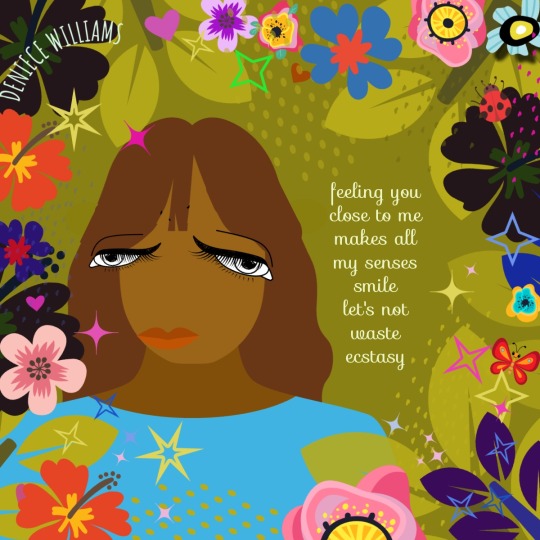
Deniece Williams is an incredibly talented singer, songwriter, and producer who has been making hit music for over 50 years. Her voice is enchanting, with a distinctive coloratura soprano and a four-octave range. She is a two-time inductee into The SoulMusic Hall Of Fame in the categories' Female Artist' and 'Lifetime Achievement.'
In the early 1970s, Deniece began her career working in a record store and then as a backup singer. She went on to become part of the female vocal trio Honeycone. In 1976, she released her debut solo album "This Is Niecy," produced by Maurice White of Earth, Wind & Fire and Charles Stepney.
"I met Maurice through a mutual friend. I had some songs on tape that I wanted him to hear," she said in an interview with Classic Soul 1976. "We had a conversation, and he told me that he thought that I should sing them myself rather than letting them go to everyone else." Deniece went on to explain she'd been concentrating on writing and getting her songs recorded. "I felt that I should get into one area — publishing — and then concentrate on others. Which is why I waited until I was ready to record."
She said of Charles Stepney, "He's probably one of the most incredibly talented arrangers that the music industry ever had. He was a very integral part of my music and the whole production and arrangement of my music and my voice. There's only been one other person in my musical life who has understood my music the way Charles Stepney did as an arranger, and he is Thom Bell."
The album featured the hit single "Free," which rose to #4 on the Billboard Hot 100 chart and was certified gold by the RIAA.
"It's amazing when you can write a lyric, and you think you're the only person that's having this experience," she said about writing "Free." "Then you put it out there, and you find out that millions and millions of people feel the same way. I think that is what happened with Free. People really do want the freedom to be themselves and to have self-expression. Also somebody told me that I was the first woman that they heard in music that told those women at that time that 'you don't have to stay'."
Deniece is also known as a prolific songwriter, with Merry Clayton, the Whispers, Frankie Valli, Billy Preston, the Emotions, and Johnny Mathis recording her songs. One of the biggest songs in her career is the infectious dance song "Let's Hear It for the Boy" from the motion picture "Footloose." The single hit #1 on Billboard's Pop and Black charts and went platinum.
Throughout her illustrious career, including 12 Grammy nominations and four wins, Deniece Williams has become known as a singer of catchy, powerful anthems of love and romance. Her music is spiritual, and she considers it an essential part of her life. Deniece's music has touched millions of people worldwide and continues inspiring new generations of musicians and music lovers alike.
0 notes
Text
i think part of why i like that woman sooo much is a desire for what i do not have like i will never ever be a woman with a crystal clear coloratura soprano voice but i think it is SO beautiful lyrically 🤷 i am easily won over by women with pretty voices
0 notes